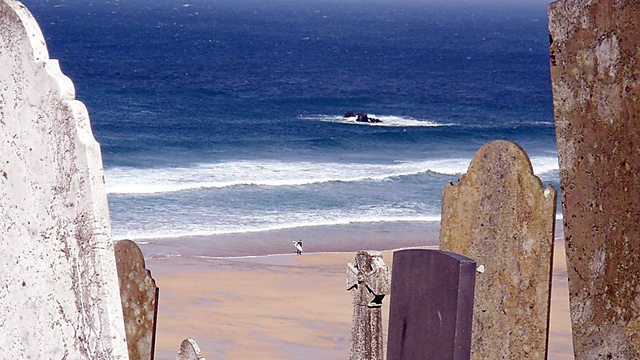
On the Edge
Texts and music exploring the idea of 'on the edge', with readings by David Threlfall and Alexandra Gilbreath. Including Kafka and JG Ballard, plus music by Wagner and Ligeti.
Words and Music exploring the idea of on the edge, writing and musical marginalia and tension. From birth to death, the seashore to the cliff, precipices and sleep, beginnings and endings, roadsides and corners, featuring artists as diverse as Wagner, Kafka, Ligeti, Ballard
With David Threlfall and Alexandra Gilbreath
Producer: Luke Mulhall.
Last on
Music Played
Timings (where shown) are from the start of the programme in hours and minutes
-
![]() 00:00
00:00Frédéric Chopin
Etudes, Op. 10 No.12 in C minor
Performer: Vladimir Ashkenazy (piano).- MELODIYA MELCD1002108.
- Tr12.
-
W.B. Yeats
The Second Coming read by David Threlfall
W.B. Yeats
The Second Coming read by David Threlfall
![]() 00:03
00:03Giuseppe Verdi
Messa da Requiem Dies irae
Performer: Sir Antonio Pappano.- EMI 6989362.
- CD1 Tr3.
John Milton
Paradise Lost read by Alexandra Gilbreath
![]() 00:06
00:06Johannes Brahms
Weighing, Op. 49 No. 4: Good evening, good night
Performer: Dietrich Fischer-Dieskau (vocal), Wolfgang Sawallisch (piano).- EMI CDS764820 2.
- CD2 Tr26.
James Joyce
Ecce Puer read by David Threlfall
![]() 00:08
00:08Faure
Requiem Agnus Dei
Performer: The Cambridge Singers, Members of The City of London Sinfonia, John Rutter (director).- COLLEGIUM COLCD109.
- Tr5.
Sylvia Plath
Edge read by Alexandra Gilbreath
![]() 00:13
00:13Henryk Mikołaj Górecki
Symphony No.3, Op. 36 II. Lento e Largo: Tranquillissimo Cantabillissimo, Dolcissimo, Legatissimo
Performer: Atlanta Symphony Orchestra, Donald Runnicles (Conductor).- TELARC CD80699.
- Tr2.
Samuel Beckett
Six Poèmes read by Alexandra Gilbreath
![]() 00:19
00:19György Ligeti
Chamber Concerto - I Corrente
Performer: London Sinfonietta, David Atherton (Conductor).- DECCA 4256232.
- Tr4.
Thomas Hardy
Beeny Cliff read by David Threlfall
![]() 00:24
00:24Claude Debussy
La Mer De l'aube à midi sur la mer
Performer: Seoul Philharmonic Orchestra, Myung-Whun Chung (Conductor).- DEUTSCHE GRAMMOPHON 4764498.
- Tr1.
Wallace Stevens
The Idea of Order at Key West read by David Threlfall
![]() 00:32
00:32����ö����
Anchor Song
Performer: ����ö����.- ONE LITTLE INDIAN TPLP31CDX.
- Tr11.
Sir Arthur Conan Doyle
The Final Problem read by David Threlfall
![]() 00:35
00:35Ludwig van Beethoven
Symphony No. 9, D minor, op. 125 Molto vivace
Performer: Berliner Philharmoniker, Ferenc Fricsay (Conductor).- DEUTSCHE GRAMMOPHON 4636262.
- Tr3.
E.T.A. Hoffmann
The Devils Elixir read by Alexandra Gilbreath
![]() 00:40
00:40Franz Schubert
Winterreise Der Leiermann
Performer: Dietrich Fischer-Dieskau, Gerald Moore (piano).- DEUTSCHE GRAMMOPHON 4151872.
- Tr24.
Joseph Conrad
Heart of Darkness read by David Threlfall
![]() 00:45
00:45György Ligeti
Trio for Violin, Horn and Piano (1982) Hommage a Brahms - IV Lamento, Adagio
Performer: André Cazalet (horn), Guy Comentale (violin), Cyril Huvé (piano).- DISQUES MONTAIGNE 782006.
- Tr8.
H.P. Lovecraft
The Dreams in the Witch House, read by Alexandra Gilbreath
![]() 00:52
00:52Christoph Willibald Gluck
Orfeo Ed Euridice Act Three - Aria: "Che Farò Senza Euridice?"
Performer: Montiverdi Choir, English Baroque Soloists, Derek Lee Ragin (Countertenor), John Eliot Gardiner (Conductor).- PHILIPS 434 093 2.
- CD2 Tr6.
Sangharakshita
The Bodhisattva Ideal read by Alexandra Gilbreath
Mumon
The Gateless Gate read by David Threlfall
![]() 00:58
00:58Johann Sebastian Bach
Partita no.3 in E major - III Gavotte en rondeau
Performer: Yehudi Menuhin (violin).- EMI CZS7678102.
- CD2 Tr12.
Franz Kafka
Cares of a Family Man read by Alexandra Gilbreath
![]() 01:03
01:03Béla Bartók
Music for Strings, Percussion And Celesta III Adagio
Performer: Academy of St Martin-in-the Fields, Neville Marriner (Conductor).- DECCA 4485772.
- Tr3.
J.G. Ballard
Crash read by David Threlfall
![]() 01:07
01:07Wagner
Tristan und Isolde - Dritter Aufzug - Mild Und Leise Wie Er Lächelt
Performer: Berliner Philharmoniker, Waltraud Meier (Soprano), Daniel Barenboim (Conductor).- TELDEC 4509 94568 2.
- CD4 Tr12.
Producer's Notes: On The Edge
From birth to death, the seashore to the cliff, precipices and sleep, beginnings and endings, roadsides and corners, and various ideas of the limits of experience, the title On The Edge has allowed me to group together texts from a wide range of sources.�� ��
The first edge in the programme is the moment when an established order gives way to an uncertain future: Chopin’s Revolutionary Etude and Yeats’ The Second Coming, followed by Milton’s account of the expulsion of the rebel angels from heaven accompanied by Verdi’s Requiem.�� The first two capture the excitement and uncertainty of the moment of transition.�� As for the second pair, the Verdi and the Milton: I decided early in the process that any setting of the Requiem Mass could have its place in this programme; and as well as being consistent with the theme of the beginning of a new order, the Milton introduces the first literal account of a fall over an edge into the proceedings when it mentions the nine days it took the rebel angels to fall from heaven down into hell.��
As the heaven-ordained order is restored at the end of the extract from Milton it seemed appropriate to move straight onto the transition over the edge into a peaceful sleep aspired to in Brahms’ Lullaby, and them immediately into the joy and grief of Joyce’s poem about the birth of his son as his father dies, a poem in which we encounter both edges of life in one.�� Faure’s rendering of the Agnus Dei and the Lux Aeterna are a fitting response to Joyce’s plea at the end of his poem, particularly in its graceful transition from the Agnus Dei over the edge into the Lux Aeterna.�� Sylvia Plath’s ‘���岵��’ asserts death as a sort of triumph, or consummation (‘we have come so far/it is over’).�� It is met here with Gorecki’s equanimity in the face of atrocity that goes over the edge.��
Next Beckett takes us, thematically, from death to the seashore, and I was struck by how easy it would have been to stay with the edge between the seashore and death.�� In the event, in Beckett’s poem the seashore’s shingle ebbs into loss, love, and death, and then the shimmering, shifting textures of Ligeti’s Chamber Concerto take us to Hardy’s much more lyrical association between death, loss and the seashore in Beeny Cliff; and the lyrical edge he finds there is picked up by Debussy in his evocation of the sea.�� Wallace Stevens, I would say, uses a restrained modernist lyricism as a bridge towards an even more mysterious edge than death, his ‘ghostlier demarcations’.�� And Bjork, as she herself tells us, lives by the ocean.��
In the second half of the programme we move inland, initially to the Bernese Oberland and the Reichenbach Falls, over the edge of which Sherlock Holmes was eventually to fall in Conan Doyle’s The Final Problem, then via Beethoven’s ‘suicide scherzo’ to the dream-like landscape of Hoffmann’s aggressively Romantic tale The Devil’s Elixir, a story that turns on exactly who has fallen over the edge of a cliff, when, and what happens to them subsequently.�� From there, we turn inwards, with accounts of people on the edge, and of what might be found on the other side.�� The protagonist of Schubert’s Winterreise asks whether he should join the hurdy-gurdy man in this, the final song of Schubert’s cycle: I suspect that for him to do so would be for him to step over the edge; the song is joined by the narrator Marlow’s defence of Kurtz in Conrad’s Heart of Darkness, on the grounds that he has stepped over the edge and offers a report of what’s to be found there.�� Ligeti’s Horn Trio meets Conrad’s extremism – each is a response to an atrocity – but Ligeti’s Trio adds a new, more formal sense of the edge: Ligeti’s manuscript of the piece is covered in marginalia, notes on the edge of the page on how he envisaged the piece being performed.�� Similarly, Yehudi Menuhin’s own copy of Bach’s Sonatas & Partitas is reported to be covered in the performer’s marginalia, a fact that informed my decision to include one of his performances in this programme.�� Picking up from Conrad, Lovecraft and Gluck both offer us reports from over the edge, although from people heading in different directions: Lovecraft’s Gilman in Dreams In The Witch House is heading over the edge into a kind of delirium beyond life; Gluck’s Orfeo laments for Euridice who has died as the couple journey back over the edge from the underworld into the light.�� ��
Two Buddhist texts point towards the paradox we meet if we try to approach the edge – then Kafka develops the sense of unease that can accompany any journey towards an edge – even if it’s just the corner of a room or other marginal part of a house, like a corridor or stairway.�� Ballard gives way completely, revelling unapologetically in the ecstasy to be found on the edge, as he examines the detritus swept to the edge of a road, and finally we join Isolde in her ecstasy as she narrates her journey over the edge into death.�� ��
��
Luke Mulhall����������
��Broadcast
- Sun 29 Jan 2017 17:30����ý Radio 3
Featured in...
![]()
Arts
Creativity, performance, debate
The hidden history of plant-based diets
Books website
Get closer to books with in-depth articles, quizzes and our picks from radio & TV.
Gallery




